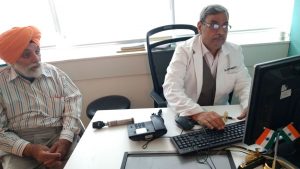Never Ignore Symptoms of Neurological Diseases: Columbia Asia Hospitals, Patiala Conducts Two-Day Health Camp for People with Brain related Diseases and Disorders
- Neurological conditions include disorders such as epilepsy, migraine, dementia, stroke, among others
- Conditions such as Dementia and Parkinson’s disease must not be considered normal part of ageing
Have you developed a sudden onset of headaches? Is your memory showing signs of slow deterioration? Do you experience constant dizziness, seizures or shivering of limbs? If yes, you must immediately consult a Neurology specialist since your symptoms might have origins in disorders of the brain or spinal cord.
Columbia Asia Hospitals, Patiala today opened a two-day Neurology camp with free of cost consultation with a Neurologist for people who have neurological conditions such as migraine, epilepsy, dementia, Parkinson’s disease or any other condition indicating a disruption in the brain’s normal functioning.
 Neurological disorders remain a highly ignored health concern in India. A large number of people with symptoms of neurological disorders either remain unaware of the seriousness of their conditions or do not consult specialists considering it a normal part of ageing. However, it is essential to underline that these conditions require medical intervention to check the progression of disease and treat their symptoms.
Neurological disorders remain a highly ignored health concern in India. A large number of people with symptoms of neurological disorders either remain unaware of the seriousness of their conditions or do not consult specialists considering it a normal part of ageing. However, it is essential to underline that these conditions require medical intervention to check the progression of disease and treat their symptoms.
“There is major lack of awareness in India about Neurological conditions. Most people are not aware that sudden onset headaches must be reported to doctors as they may indicate a serious underlying condition such as a sub-dural hematoma or even brain tumor. Most people also believe that loss of memory or weakness of the limbs is a normal part of ageing when this can be a sign of Alzheimer’s or Parkinson’s disease. Our camp is aimed at encouraging all people who have symptoms of neurological diseases to come out and consult a specialist,†says Dr. Satwant Sachdeva Sr. Consultant Neurologist Columbia Asia Hospital, Patiala.
Diseases of the central and peripheral nervous system are referred to as neurological disorders. In other words conditions arising from disorders in the brain, spinal cord, cranial nerves, peripheral nerves, nerve roots, autonomic nervous system, neuromuscular junction, and muscles are neurological diseases. These conditions include epilepsy, dementia, stroke, migraine, multiple sclerosis, Parkinson’s disease, neuroinfections, brain tumours, traumatic disorders of the nervous system, and neurological disorders as a result of malnutrition. Bacterial, viral, fungal and parasitic infections can also affect the nervous system.
According to World Health Organization (WHO), millions of people worldwide are affected by neurological disorders. More than 6 million people die because of stroke each year; over 80% of these deaths take place in low- and middle-income countries like India. More than 50 million people have epilepsy worldwide. It is estimated that there are globally 47.5 million people with dementia with 7.7 million new cases every year – Alzheimer’s disease is the most common cause of dementia and may contribute to 60–70% of cases. The prevalence of migraine is more than 10% worldwide.
The health camp offered free of cost consultation with a Neurologist along with investigative examinations such as EEG, EMG, and NCS at discounted rates.




